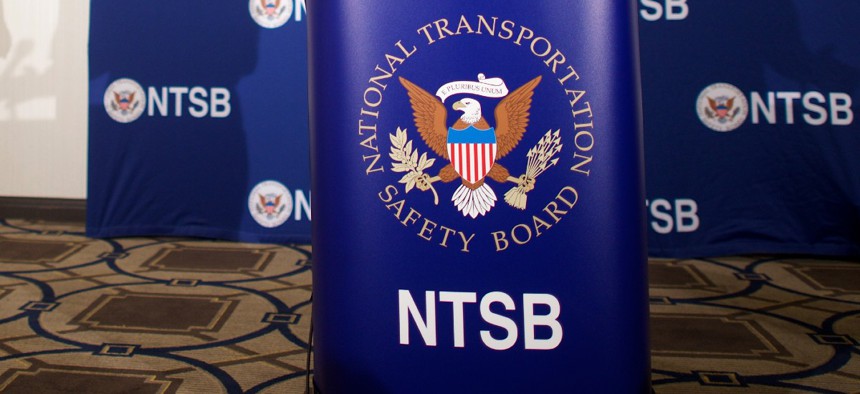NTSB Only Federal Agency Lacking a CISA-Mandated Vulnerability Disclosure Policy

Mark Makela/Getty Images
CISA’s 2020 directive required that federal agencies under its authority develop policies allowing researchers to report bugs and flaws in public-facing systems.
The National Transportation Safety Board is the only federal civilian agency under the authority of the Cybersecurity and Infrastructure Security Agency that has not developed and implemented a required vulnerability disclosure policy, according to a review conducted by Nextgov.
CISA issued Binding Operational Directive 20-01 on Sept. 2, 2020, which required that all 101 federal civilian executive branch agencies under CISA’s authority develop formal vulnerability disclosure policies. These policies enable security researchers and ethical hackers to legally identify and report vulnerabilities in agencies’ internet-accessible information systems, while also outlining the reporting, handling and remediation responsibilities of the federal agencies receiving and processing cyber risk reports.
Under the directive, federal agencies were required to “publish a vulnerability disclosure policy as a public web page” within 180 calendar days of the order’s issuance. CISA also created and shared a template for agencies to use when drafting their own policies, essentially enabling covered federal entities to tailor the policy to their needs. As of Sept. 2 this year, the directive said that federal agencies covered by the mandate must have “all internet-accessible systems or services” within the scope of their vulnerability disclosure policies.
When first contacted about the vulnerability disclosure policy requirement, an NTSB spokesperson said that the policy did not apply to the agency, because CISA’s directive was “addressed to executive branch departments and agencies and other security related agencies” and NTSB is “an independent federal agency charged by Congress with investigating every civil aviation accident in the United States and significant accidents in other modes of transportation—railroad, highway, marine and pipeline.”
However, after being contacted by CISA about their lack of compliance with the requirement, the spokesperson backtracked and said that the agency received more information and that the directive “does involve NTSB.”
“Due to the staffing resources needed for smaller agencies like NTSB to support such a program, CISA arranged their vulnerability disclosure policy platform to address a significant portion of the program’s requirements,” the spokesperson said.
CISA announced last July that it launched a VDP platform to help federal civilian agencies use one centralized location to gather and share information about potential software liabilities. When it comes to federal agencies’ compliance with the vulnerability disclosure policy directive, the VDP platform “automatically facilitates the majority of required compliance reporting metrics to CISA on behalf of the participating agencies, reducing agency reporting efforts.”
“NTSB immediately expressed interest to CISA to be a participant in their program and are on their list for implementation,” the spokesperson added. “Their system became fully authorized to operate in March of 2022 and NTSB is on track to be operational on it by the end of this fiscal year. The policy is expected to be posted at that time.”
All 23 of the agencies currently using the VDP platform—which range in size from the Department of Homeland Security, to the Federal Communications Commission, to the American Battle Monuments Commission—implemented vulnerability disclosure policies last year, within the timeframe originally mandated by CISA’s directive. And although the directive said CISA would “monitor agency compliance to this directive and may take actions for non-compliance,” CISA said it’s the agencies themselves that are expected to develop and implement their mandates.
“For all Binding Operational Directives, CISA communicates requirements, timelines and expectations to all federal civilian agencies under its authorities; conducts extensive engagement at individual agencies; and provides implementation guidance, webinars and other tools in support of BOD implementation,” CISA Associate Director Michael Duffy told Nextgov in a statement. “CISA maintains a dedicated team to track agency compliance with CISA directives and works extensively with agencies to address any challenges in implementing directive requirements.”
A CISA spokesperson added that the heads of federal agencies are ultimately accountable for ensuring timely implementation of CISA’s cybersecurity requirements, but that CISA works to help agencies maximize their compliance with all of its directives.
The vulnerability disclosure policies, in particular, allow federal civilian agencies to leverage the expertise and experience of security researchers, while also outlining clear timeframes for remedying potential risks in their systems.
Brian Harrell, a former assistant secretary at DHS and the first CISA assistant director for infrastructure security, told Nextgov that vulnerability disclosure policies are important because they “enhance the resilience of the government’s cyber posture by encouraging meaningful collaboration between federal agencies.”
“It’s difficult for a single agency, whether public or private, to fully recover from a cyber incident in isolation,” Harrell said. “These disclosures are meant to promote awareness and give agencies experiencing a cyber intrusion the resources and expertise needed to respond and recover. CISA has highlighted an important need, which frankly, I view as doing the basics.”
While NTSB is the only agency under CISA’s authority that currently lacks a vulnerability disclosure policy, it is not the only small independent agency that put off implementation of a vulnerability disclosure policy until this year.
A March 2022 report on the Chemical Safety and Hazard Investigation Board’s information security program, produced for the Environmental Protection Agency’s Office of Inspector General, found that CSB lacked a mandated vulnerability disclosure policy. In response to the report’s recommendations, CSB “approved and published a vulnerability disclosure policy” before the end of March.
Jim Richberg, public sector field CISO at Fortinet and the former cyber chief of the Office of the Director of National Intelligence, said it was important for CISA to lay out the vulnerability disclosure policy requirement, but noted that “it can be a lot of work” for non-cabinet level agencies like NTSB and others to comply with the directive.
“Especially for small agencies, where they don’t have a lot of staff already and they’re already busy doing core functions, having to start answering questions about misconfigurations and even bonafide vulnerabilities can be difficult,” Richberg added.
Editor's note: This story has been updated.






